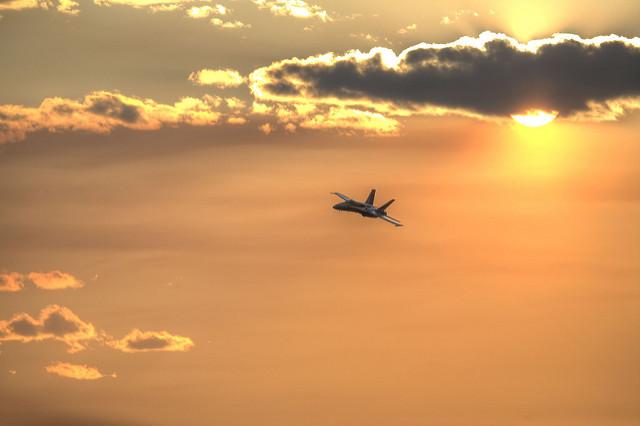Trudeau’s folly: Canada’s new ‘interim’ fighters
Posted By Christopher Cowan on November 24, 2016 @ 14:15

Canada, much like Australia, has seen its plans to replace its current fleet of ageing fighter jets bedevilled by controversy. Tuesday’s announcement [1] that the Canadian government intends to acquire 18 F/A-18E/F Super Hornets to supplement its current fleet of 77 CF-18s [2] and hold an open competition for their eventual replacement isn’t likely to help matters. While the acquisition of 18 Super Hornets for the Royal Canadian Air Force (RCAF) is by no means the worst solution to Canada’s fighter aircraft problem, it’s a political fix to a problem of Canadian Prime Minister Justin Trudeau’s own making.
The decision to acquire a few Super Hornets now and eventually replace the fighter fleet down the road can be traced to the toxicity of the proposed F-35A acquisition in Canadian politics. Concerns over the acquisition and support costs of the sole-sourced F-35A contract led to the dissolution [3] of Stephen Harper’s Conservative minority government in 2011. Prime Minister Justin Trudeau, leader of the Liberal Party, campaigned in 2015 on the promise that ‘we will not buy the F-35 stealth fighter-bomber [4]’. After winning office, he cancelled [5] Canada’s F-35A purchase in favour of a new ‘open and transparent’ competition for a new fighter. In hindsight, immediately disqualifying the F-35A from any competition may not have been the most prudent decision.
Interestingly, the Government of Canada’s official news release suggests [1] that the F-35A will be allowed to enter Canada’s upcoming competition, contrary to Trudeau’s election promise and previous prime ministerial statements. That makes sense given the current amount of Canadian industry involvement [6] in the program (thought to be worth around C$825m). Thus, it appears that the F-35 could still win the competition and eventually form the core of the RCAF’s fighter arm, much to the RCAF’s delight (it has always wanted the F-35A) and to PM Trudeau’s chagrin.
In some ways acquiring Super Hornets as a stopgap before a decision is made on the permanent fleet makes sense. Kicking the can down the road gives the US Air Force and Lockheed Martin time to work the kinks out of the F-35. Reducing the aircraft’s flyaway unit cost by ramping up production before a prospective Canadian CF-35 purchase (assuming it wins the competition) would make the acquisition more politically palatable.
But the Super Hornet solution won’t be as cheap as many in the Trudeau government would hope. While the price for Canada’s prospective deal is unknown, Australia paid A$6.1bn [7] (in 2010 dollars) to acquire and support the 24 Super Hornets it purchased in 2007 as a hedge to delays in the F-35A program. The flyaway unit costs of the Australian aircraft accounted for about half of that total, while the rest was spent on facilities, training, support, and sustainment. Canada, with six fewer aircraft, will face the same fixed costs as Australia did in 2007, but Australia’s purchase came while the Super Hornet production line was hot, which helped bring unit costs down.
Luckily for Canada, the Super Hornet production may be heating up again. Kuwait recently inked [8] a deal to buy 40 Super Hornets (plus the necessary logistics and support) for US$10.1bn (A$13.6bn) and the US Navy is also looking to add another 16 Super Hornets [9] to its fleet by FY2018, in addition to the five it acquired in FY2016 at a flyaway unit cost of approximately US$70m. The Navy estimates that those 16 Super Hornets will have flyaway unit costs of around US$76m (2016 dollars), an increase of about 10% over the FY2016 Super Hornets. The Kuwaiti purchase may help bring that unit cost down for the Canadian Super Hornets through economies of scale, but it’s difficult to say when or by how much. Considering that the US Air Force projects that the F-35A costs will come down to around US$99m per aircraft [10] (2016 dollars) by the 2020s, the Super Hornet will only be about 20% less expensive than the F-35A Canada decided not to buy (and that’s just an acquisition cost).
But the real issue is that this decision is ultimately a political solution to an avoidable problem. The delay of the CF-18 replacement aircraft by successive governments has left the RCAF with a capability gap [11] according to Defence Minister Harjit Sajjan (although RCAF officials disagree [12]). But PM Trudeau is unwilling to break his election promise that Canada won’t be buying the F-35A under his tenure and acquiring 18 Super Hornets as an interim solution to a capability gap that may or may not exist, allowing him to keep that promise. The government’s statement that a decision on a permanent replacement will be made five years after the competition opens (a competition that the F-35A may very well win [13]) also allows them to push back the decision until after the next election. So the Canadian taxpayer ends up paying for the Super Hornets now, as well as the fleet’s permanent replacement in 2020s all to keep an election promise. Politics has trumped common sense, and the average Canadian’s wallet will be lighter in the future as a result.
Article printed from The Strategist: https://aspistrategist.ru
URL to article: /trudeaus-folly-canadas-new-interim-fighters/
URLs in this post:
[1] announcement: http://news.gc.ca/web/article-en.do?mthd=index&crtr.page=1&nid=1158669
[2] CF-18s: http://www.rcaf-arc.forces.gc.ca/en/aircraft-current/cf-188.page
[3] dissolution: http://www.cbc.ca/news/politics/government-s-defeat-sets-up-election-call-1.1068749
[4] we will not buy the F-35 stealth fighter-bomber: https://www.liberal.ca/realchange/f-35/
[5] cancelled: http://www.smh.com.au/world/canadas-trudeau-will-dump-130-million-stealth-jets-australia-wants-to-buy-20151020-gke0u7.html
[6] Canadian industry involvement: http://www.cbc.ca/news/politics/fighter-jet-purchase-announcement-1.3862210
[7] paid A$6.1bn: /super-hornets-australias-interim-air-combat-capability/
[8] inked: http://www.defensenews.com/articles/kuwait-qatar-fighter-jet-deals-move-forward-likely-putting-boeing-fighter-jet-production-into-the-2020s
[9] add another 16 Super Hornets: http://www.secnav.navy.mil/fmc/fmb/Documents/17pres/APN_BA1-4_BOOK.pdf
[10] US$99m per aircraft: http://www.saffm.hq.af.mil/Portals/84/documents/FY17/AFD-160208-044.pdf?ver=2016-08-24-102038-590
[11] capability gap: http://www.cbc.ca/amp/1.3623418
[12] disagree: http://www.huffingtonpost.ca/2016/06/10/baloney-meter-is-there-a-capability-gap-when-it-comes-to-fighter-jets_n_10393572.html
[13] win: /canadas-f-35-yeah-but-no-but-yeah/
Click here to print.